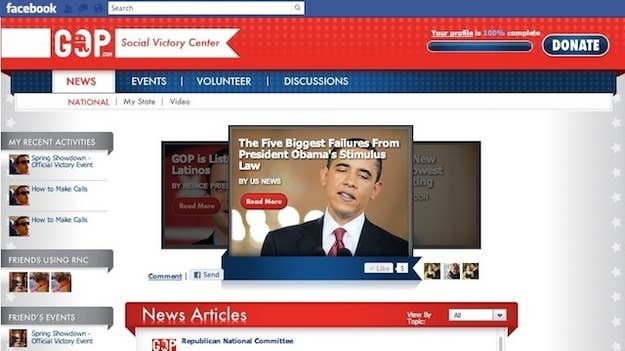
The Republican National Committee plans Tuesday to hold a press conference about its new Facebook app — a sign of progress, and a the same time a mark of the enduring chip on Republican shoulders over the perceived Democratic online advantage.
In 2008, what insiders described to BuzzFeed as an underfunded Republican web operation watched in envy as candidate Barack Obama built a huge online organization and raised hundreds of millions of dollars on the Web — and got treated by the media like he had invented the Internet. Now Republicans, still playing technological catch-up to a high-tech Obama machine despite the energetic online conservative grassroots, is hoping to cut into both the Democrats’ advantage and the Republican inferiority complex.
Republicans are also hoping that the broad shift from portals to search to social platforms led by Facebook and Twitter offers an opportunity to pull even with Democrats.
Republicans in 2008 “had less resources than Democrats, because on our side it was secondary,” Romney campaign digital director Zac Moffat told BuzzFeed. “Now, our target voters are on Facebook and Twitter, and we’re going where they are.”
In 2008 Facebook was populated by a surrogate army of teenagers and twenty-somethings ready to take Obama’s message and organize around it. Today women over the age of 55 are the fastest-growing demographic on the more ideologically balanced, and gigantic, social service.
But Republican digital operatives remain intensely conscious of the perception that they’re laggards, a sore spot that was prodded when the trade publication ClickZ last week described the RNC’s 2008 efforts as “lackluster.”
Liz Mair, the RNC’s online communications director in 2008, launched what else but a Twitter campaign with the hashtag #lackluster to rebut the article’s assertion.
The Republican strategy in 2008 was aimed at a broad audience, with a focus on popular portals like AOL and Yahoo to drive the national conversation.
"I look at the universe of some of the sites that have fallen out of favor that still have audiences that anyone would be attracted to – audiences in the hundreds of millions," the RNC’s 2008 eCampaign director, Cyrus Krohn, told POLITICO in 2007, referring to sites like YouTube and MySpace as “fads."
Korhn told BuzzFeed on Monday that his plan to focus on Internet titans was an “effort unfulfilled,” and that plans to pair digital records with voter databases were hamstrung by a lack of resources.
“We were outspent by leaps and bounds in digital infrastructure and marketing preventing true success,” he said.
And some GOP digital operatives question whether the type of grassroots engagement Obama pioneered in 2008 was even possible for Republicans, pointing to the gap between the medium and the messenger.
“Obama was a community organizer, so it's not too surprising that the really innovative portion of his digital stuff was to do with organizing people,” she said. “McCain was the guy who always seemed to be on ‘Meet the Press’ and doing townhalls, so it's perhaps not surprising that much of the most innovative stuff on our side was more communication-driven/oriented.”
Mair’s job was focused on online outreach — engaging in a Twitter debate about tech policy and using blogs like BlogHer and other networks that have been supplanted by Facebook to reach women.
“If I was trying to reach women online now, I’d be on Pinterest,” she said, highlighting it as an example of a rapidly changing web.
The former RNC staffers’ defense of their work was cheered on by many of their counterparts across the aisle, who may also have seen an opportunity to jab their current rivals.
“In ‘08 they ran an actual online program and they were focused on getting the message out online,” former Democratic National Committee digital strategist Kombiz Lavasany told BuzzFeed. “We actually paid attention to what they were doing. That’s not the case right now.”
The new RNC app is designed to be more bottom-up on the Obama model, existing on Facebook rather than the campaign website and built to allow supporters to call voters in swing states, share news with their friends, and find nearby campaign events.
“This wasn’t even possible for us four years ago,” RNC communications director Sean Spicer told BuzzFeed, noting that Facebook was limited to .edu addresses (and thus a more-Democratic-leaning user base) until 2006.
But Democrats are still confident in the superiority of their digital strategy, with one Obama aide questioning why it’s news that the RNC is matching the Democrat’s capabilities four years later.
“The Romney campaign and the RNC are just playing catch-up with the Obama campaign four years ago,” said Matt Ortega, a 2008 DNC digital staffer.
